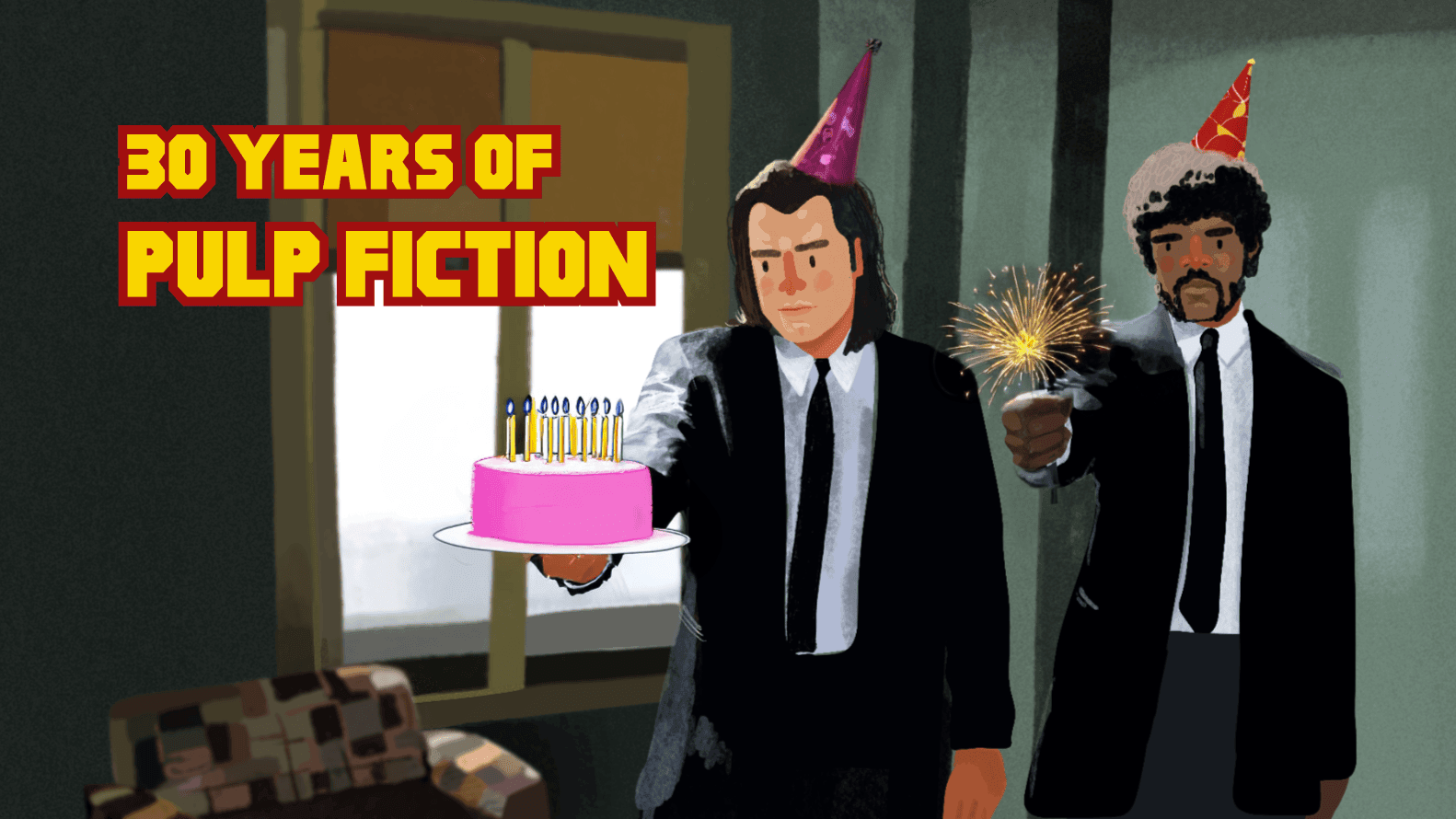Why "Pulp Fiction" is Iconic: Marking 30 Years of Legacy
This year marks 30 years of Quentin Tarantino's "Pulp Fiction". At Filmustage, we cherish Tarantino's work, and this film holds a special place in our hearts. Join us as we explore why, even after three decades, "Pulp Fiction" remains the ultimate indie hit.


In 1994, Quentin Tarantino shook up the film world with "Pulp Fiction", a movie that didn’t just entertain — it redefined modern cinema. Bold, unapologetic, and dripping with style, it broke every rule, from its nonlinear storytelling to razor-sharp dialogue and unforgettable characters. Let’s uncover why the world fell in love with "Pulp Fiction" just as much as we did.
By the way, to celebrate the film’s 30th anniversary, we’re still running a special Black Friday offer! You can grab our popular annual plans for just $99. Don’t miss out — find all the details here!
🎬 Quentin Tarantino’s Unique Storytelling
One of Quentin Tarantino’s most groundbreaking features in "Pulp Fiction" is its narrative structure. Tarantino rejected the conventional linear storytelling format, opting instead for a fragmented timeline. This decision invited audiences to actively engage with the film, piecing together its events like a puzzle. The nonlinear narrative wasn’t just a gimmick; it amplified the tension and allowed the audience to see characters and events from different perspectives, adding depth and meaning to the story.
Each chapter of the filmb — "Vincent Vega and Marsellus Wallace's Wife", "The Gold Watch", and "The Bonnie Situation" — is a self-contained tale that contributes to a larger tapestry. For instance, the opening diner robbery scene becomes far more impactful when revisited at the end, with the audience now understanding Jules’ moral transformation.
Tarantino’s use of dialogue to drive the plot, rather than relying on traditional action sequences, was equally innovative. Seemingly mundane conversations, like Vincent and Jules discussing fast food or foot massages, added layers to their characters and built tension in unexpected ways. The slow build-up to shocking moments — such as the accidental shooting of Marvin — made the film’s surprises all the more effective.
This storytelling approach not only set "Pulp Fiction" apart from other films of the time but also influenced countless filmmakers, from Christopher Nolan ("Memento") to Alejandro González Iñárritu ("21 Grams"). Tarantino showed that storytelling could be an art form in itself, encouraging directors to take risks and experiment with narrative structure.
🎞 Blurring Genre Lines
One of "Pulp Fiction’s" greatest achievements is its ability to defy and blend genres, creating a film that feels both fresh and timeless. At its core, it’s a crime movie, but it doesn’t conform to the typical structure or tone of the genre. Instead, it incorporates elements of dark comedy, drama, thriller, and even romance, keeping audiences constantly guessing what will happen next.
The film’s title itself is a nod to pulp magazines, known for their sensational and gritty stories. Quentin Tarantino takes that inspiration and elevates it, delivering a movie filled with sensational moments but grounded in sharp writing and layered characters. Violence, a hallmark of crime films, is present but often offset by humor and absurdity — like the accidental shooting of Marvin, which turns a grisly moment into one of the film’s funniest scenes.
This genre-blending approach gives "Pulp Fiction" its unique tone, where moments of tension are broken by humor, and deep philosophical discussions unfold amid chaos. By refusing to be boxed into a single genre, Tarantino created a film that appeals to a wide range of audiences, influencing countless filmmakers to experiment with storytelling and tone.
"Pulp Fiction" isn’t just a crime film, a comedy, or a drama — it’s all of these and more, a testament to the boundless potential of cinema when traditional rules are broken.
🌟 Bright Characters
The brilliance of "Pulp Fiction" lies in its characters — flawed, complex, and utterly unforgettable. Quentin Tarantino’s talent for crafting deeply human, idiosyncratic personalities is on full display, with each character etched into the audience’s memory through sharp dialogue, unique quirks, and morally ambiguous decisions.

Jules Winnfield (Samuel L. Jackson)
Jules, the philosophical hitman, stands out as one of cinema’s most compelling antiheroes. Samuel L. Jackson’s commanding presence and delivery of Tarantino’s masterful dialogue brought Jules to life. His transformation from a cold-blooded killer to someone seeking redemption added a surprising layer of depth to the character. Jules’ monologue quoting Ezekiel 25:17 is one of the film’s most iconic moments, blending intimidation, spirituality, and self-discovery in a way that only Tarantino could achieve.
Vincent Vega (John Travolta)
John Travolta’s Vincent Vega is equally iconic — a smooth-talking, drug-using hitman whose casual demeanor often contrasts with the violence of his job. Whether he’s discussing the nuances of European fast food, nervously taking Mia Wallace out for a night on the town, or clumsily managing a heroin overdose crisis, Vincent is a walking contradiction. Travolta’s performance revitalized his career, earning him an Oscar nomination and cementing him as one of the film’s defining faces.
Mia Wallace (Uma Thurman)
Mia Wallace, played by Uma Thurman, is an enigma wrapped in charm and danger. Her razor-sharp wit and undeniable presence make her one of the most captivating characters in "Pulp Fiction". From her philosophical musings on uncomfortable silences to her iconic twist dance with Vincent, Mia is a force of nature. Thurman’s portrayal turned her into a cultural icon, with her black bob haircut and white shirt becoming an instantly recognizable symbol of 1990s cinema.
Butch Coolidge (Bruce Willis)
Butch Coolidge is a boxer with a sense of honor and a penchant for getting into trouble. His storyline adds grit and unpredictability to the film. Bruce Willis brings intensity to the role, particularly in moments like the harrowing pawnshop scene, where Butch’s survival instincts and moral compass collide. His journey, driven by loyalty to his father’s memory (embodied in the gold watch), humanizes him and makes his arc profoundly satisfying.
Supporting Characters
Tarantino’s supporting cast is equally rich. Marsellus Wallace (Ving Rhames) commands fear and respect, despite spending much of the movie offscreen. Honey Bunny (Amanda Plummer) and Pumpkin (Tim Roth) bring chaos to the opening and closing scenes, bracketing the film with high-stakes tension. Even minor characters, like The Wolf (Harvey Keitel), leave a lasting impression with their sharp, efficient personalities.
The Dialogue That Defines Them
What makes these characters truly unforgettable is Tarantino’s gift for dialogue. Every line feels authentic yet elevated, capturing the essence of each character. Conversations about hamburgers, massages, or the importance of a family heirloom might seem trivial, but they reveal personality, build relationships, and create an immersive world.
Why They Endure
The characters of "Pulp Fiction" endure because they’re not just archetypes — they’re fully realized individuals. They make mistakes, face consequences, and occasionally find redemption. Their humanity, humor, and contradictions resonate with audiences, making them timeless figures in the cinematic landscape.
🎭 Reviving Careers

"Pulp Fiction" played a pivotal role in revitalizing the careers of several actors and cementing others as Hollywood powerhouses. John Travolta, whose career had been in decline since his glory days in the ’70s and ’80s, saw a major resurgence as Vincent Vega. His cool, quirky portrayal earned him an Oscar nomination and reintroduced him as a bankable star, leading to a string of hits like "Get Shorty" and "Face/Off".
Samuel L. Jackson, though a rising talent, experienced a breakthrough with his electrifying performance as Jules Winnfield. His commanding presence and delivery of the Ezekiel 25:17 monologue turned him into a household name and a go-to actor for dynamic, intense roles.
For Uma Thurman, "Pulp Fiction" was the role that made her a star. Her performance established her as a muse for Quentin Tarantino, leading to later collaborations like "Kill Bill".
Bruce Willis, already known as an action hero, used the role of Butch Coolidge to showcase his range, stepping into a grittier, more layered character. This performance reminded audiences of his dramatic potential and opened doors to critically acclaimed projects like "The Sixth Sense".
Tarantino’s keen eye for casting didn’t just revive these careers; it redefined how Hollywood viewed its talent.
🎥 Reinventing Independent Cinema
"Pulp Fiction" wasn’t just a critical and commercial success — it was a game-changer for independent filmmaking. Produced on a modest budget of $8 million, the film grossed over $200 million worldwide, proving that independent films could dominate both the box office and the awards circuit. Its Palme d’Or win at the Cannes Film Festival was a major validation of its artistic merit, while its widespread popularity showed that audiences were hungry for bold, unconventional storytelling.
Quentin Tarantino’s success with "Pulp Fiction" inspired a wave of indie filmmakers to take risks, both creatively and financially. The film’s combination of raw dialogue, nonlinear storytelling, and offbeat humor broke away from Hollywood’s formulaic approach, showing that originality could triumph over big-budget spectacles.
It also challenged perceptions of what an independent film could look like. With its polished cinematography, iconic soundtrack, and A-list cast, "Pulp Fiction" blurred the line between indie and mainstream cinema. By doing so, it opened the door for more independent films to reach wider audiences and reshaped the landscape of 1990s filmmaking.
🍿 Cultural Impact
"Pulp Fiction" left an indelible mark on popular culture, influencing everything from dialogue to fashion and music. Its scenes and lines became iconic almost instantly. Jules Winnfield’s fiery Ezekiel 25:17 monologue, the twist dance between Vincent and Mia at Jack Rabbit Slim’s, and the adrenaline shot sequence are still celebrated and parodied across media. Lines like “Say what again!” and “Zed’s dead, baby” became part of everyday language.
The film’s soundtrack played a huge role in its cultural impact. With tracks like "Misirlou" and "Son of a Preacher Man", it revived retro music and demonstrated how a perfectly curated score could become inseparable from the story. The eclectic mix gave the film a timeless energy and brought older tracks back into mainstream popularity.
Its visual style also influenced trends, from Mia’s sleek bob haircut to the retro aesthetics of the 1950s-inspired diner. "Pulp Fiction" blended genres and tones so seamlessly that its approach to storytelling and design became a template for countless creators.
Even 30 years later, "Pulp Fiction" remains a cornerstone of pop culture, referenced in everything from TV shows to advertising.
A Lasting Legacy
“Zed’s dead, baby. Zed’s dead.” But "Pulp Fiction" is very much alive. Thirty years later, it still inspires, entertains, and redefines what cinema can be. With its unique style and cultural impact, Tarantino’s masterpiece remains a force in pop culture. Here’s to the legend of "Pulp Fiction"!
From Breakdown to Budget in Clicks
Save time, cut costs, and let Filmustage’s AI handle the heavy lifting — all in a single day.